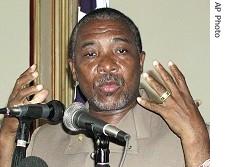NIGERIA UNDER PRESSURE TO SURRENDER TAYLOR FOR TRIAL
 Charles Taylor is wanted
Charles Taylor is wantedfor war crimes in Liberia
International Pressure On Nigeria
To Surrender Former
Liberian President For Trial
By Gabi Menezes, Abidjan, 21 July 2005.
Charles TaylorNigeria is resisting mounting international pressure to extradite former Liberian President Charles Taylor for trial at an international tribunal on war crimes charges. Mr. Taylor went into exile in Nigeria in 2003 as part of a peace deal to end the civil war in Liberia. Nigeria says it will not extradite Mr. Taylor without proof of allegations he has violated the terms of his exile.
For two years, a U.N.-backed Special Court for Sierra Leone has wanted Charles Taylor to stand trial on war crimes charges related to allegations he stirred up a rebellion in Sierra Leone. The charges include murder, sexual slavery, and the use of child soldiers.
With rebels poised to attack Monrovia, Mr. Taylor agreed to step down in 2003, and go into exile in Nigeria as part of the terms of a peace deal to end 14 years of civil war.
A spokeswoman for Nigerian President Olusegun Obasanjo, Remi Oyo, says the offer of asylum was imperative to save the people of Liberia from further bloodshed, and to end decades of conflict.
"At that time, the president of the Federal Republic of Nigeria said that Nigeria would not be harassed or intimidated over this humanitarian gesture, which had support of not only the United States, but also the countries in Western Europe," she said.
Western governments, including the United States, have repeatedly called for Mr. Taylor to be surrendered to the special court. Ms. Oyo says that Nigeria will consider giving up Mr. Taylor only after Liberian elections are held in October.
The civil war in Liberia split the country among various rebel movements. Mr. Taylor, as the leader of the largest-rebel group, the National Patriotic Front of Liberia, has been accused of expanding the conflict into neighboring Sierra Leone by backing the Revolutionary United Front rebels, and profiting from Sierra Leone's diamond trade.
The Revolutionary United Front rebels launched an invasion against the Sierra Leonean government from Liberia in 1991, and were responsible for many atrocities, including hacking off victims' hands.
The prosecutor for Sierra Leone's Special Court, Desmond de Silva, says Nigeria should extradite Mr. Taylor because he has broken the terms of his exile.
"President Obasanjo took Taylor out of the equation in Liberia, and helped the peace process to start in Liberia, and we are all very grateful to President Obasanjo for having done that," he said. "But the fact is, it was quite clear, and Nigerian authorities have admitted it, that Taylor was taken into Nigeria on condition that he did not meddle in the affairs of Liberia and the affairs of West Africa."
In a recent report to the U.N. Security Council, Secretary-General Kofi Annan said Mr. Taylor is suspected of trying to influence the outcome of Liberia's presidential election, due in October, which would be a clear violation of the exile agreement.
Although Mr. De Silva would not go into detail about the evidence against Mr. Taylor, he says it is important for regional stability that Mr. Taylor be put on trial before Liberia's elections. He also says it is vital to establish a principle that everyone, including heads of state, is subject to international law.
"One of the sadness of the world is that the big fish seem to escape the net," he said. "The object of these international criminal tribunals is to bring to account the biggest of the big fish. Now, these international courts are set up to bring the culture of impunity to an end, and [if] the big fish are seen to be escaping one way or another, then the culture of impunity will not be brought to an end."
Mr. de Silva's predecessor in the Special Court, David Crane, said Mr. Taylor was profiting from businesses in Liberia and a wide international criminal network. He also accused Mr. Taylor of backing candidates in Liberia's October elections.
On a recent visit to Liberia, the U.N. High Commissioner for Human Rights, Louise Arbour, called for Charles Taylor to stand trial, saying there cannot be a lasting peace without justice.
A West Africa researcher for the international advocacy group Human Rights Watch, Corinne Dufka, says African states are unlikely to support calls for Mr. Taylor's trial, and will remain silent on the issue.
"Nigeria is concerned about setting a precedent of a head of state being held accountable for war crimes, crimes against humanity," she said. "As we know, there have been many crimes committed by African and other governments, by heads of state."
Human Rights Watch has joined a coalition of 300 African and international civil society groups asking the 53-member African Union to honor its human rights commitments, and bring Mr. Taylor to justice.

Comments